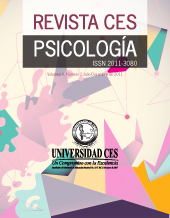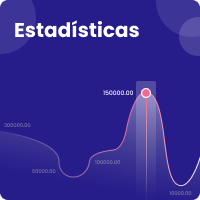Análisis Rasch del Mini Mental State Examination (MMSE) en adultos mayores de Antioquia, Colombia
DOI:
https://doi.org/10.21615/cesp.10.2.2Palabras clave:
Salud Mental, Cognición, Anciano, Estudios de ValidaciónResumen
Objetivo. Evaluar las evidencias de validez del Mini Mental State Examination que sustentan su interpretación en adultos mayores. Métodos. Estudio de fuente secundaria con la participación de 4034 adultos mayores residentes de Antioquia, Colombia, 2012. Se siguieron los lineamientos de Wolfe y Smith para análisis desde el modelo Rasch. Resultados. Se identificó dependencia local entre los ítems de atención y cálculo. Estos producen una segunda medida que afecta la unidimensionalidad del instrumento. La confiabilidad de los ítems fue de 0,80, la medida explicó el 45,2% de la varianza de las puntuaciones crudas. Conclusión. Los resultados sugieren diferenciar las habilidades de atención y cálculo de los demás procesos cognitivos considerados por el instrumento. El MMSE presenta limitaciones de validez de generalización que potencialmente afectan comparaciones transculturales.
Descargas
Referencias bibliográficas
Babacan-Yıldız, G., Ur-Özçelik, E., Kolukısa, M., Işık, A. T., Gürsoy, E., Kocaman, G., & Çelebi, A. (2016). [Validity and Reliability Studies of Modified Mini Mental State Examination (MMSE-E) For Turkish Illiterate Patients With Diagnosis of Alzheimer Disease]. Türk Psikiyatri Dergisi = Turkish Journal of Psychiatry, 27(1), 41-46.
Bell R, & Hall RC. (1977). The mental status examination. American Family Physician, 16(5), 635-641. Recuperado a partir de http://search.ebscohost.com/login.aspx?direct=true&db=mdc&AN=920569&site=eds-live
Bermejo Pareja, F., Díaz Guzmán, J., & Porta-Etessam, J. (2001). Cien escalas de interés en neurología clínica. Barcelona.: Prous Science.
Bland, J. M., & Altman, D. G. (1986). Statistical methods for assessing agreement between two methods of clinical measurement. Lancet, 1(8476), 307-310.
Bond, T. (2004). Validity and assessment: a Rasch measurement perspective. Metodología de las Ciencias del Comportamiento, 5, 179–194.
Bond, T. G., & Fox, C. M. (2001). Applying the Rasch Model: Fundamental Measurement in the Human Sciences. Erlbaum.
Arango, D. C., Cardona, A. S., Duque, M. G., Cardona, A. S., & Sierra, S. M. C. (2016). Health status of elderly persons of Antioquia, Colombia. Revista Brasileira de Geriatria E Gerontologia, 19(1), 71-86. https://doi.org/10.1590/1809-9823.2016.14199
Carnero-Pardo, C. (2014). ¿Es hora de jubilar al Mini-Mental? Neurología, 29(8), 473-481. http://doi.org/10.1016/j.nrl.2013.07.003
Cortés-Muñoz, C., Cardona-Arango, D., Segura-Cardona, Á., & Garzón-Duque, M. O. (2016). Demographic, social, physical and mental factors associated with functional capacity in the elderly, Antioquia, Colombia, 2012. Revista de Salud Pública, 18(2), 167-178. http://doi.org/10.15446/rsap.v18n2.49237
Creavin, S. T., Cullum, S. J., Haworth, J., Wye, L., Bayer, A., Fish, M., … Ben-Shlomo, Y. (2016). Towards improving diagnosis of memory loss in general practice: TIMeLi diagnostic test accuracy study protocol. BMC Family Practice, 17(1), 79. http://doi.org/10.1186/s12875-016-0475-2
Engelhard, G. (2013). Invariant measurement: using Rasch models in the social, behavioral, and health sciences. New York: Routledge.
Fischer, G. H., & Molenaar, I. W. (1995). Rasch Models: Foundations, Recent Developments, and Applications. Springer.
Fliss, R., Lemerre, M., & Mollard, A. (2016). Performances on a cognitive theory of mind task: specific decline or general cognitive deficits? Evidence from normal aging. Geriatrie Et Psychologie Neuropsychiatrie Du Vieillissement, 14(2), 221-230. http://doi.org/10.1684/pnv.2016.0603
Folstein, MF., Folstein, SE., & McHugh, PR. (1975). «Mini-mental state». A practical method for grading the cognitive state of patients for the clinician. Journal Of Psychiatric Research, 12(3). Recuperado a partir de http://search.ebscohost.com/login.aspx?direct=true&db=mdc&AN=1202204&site=eds-live
Jones, R. N. (2006). Identification of measurement differences between English and Spanish language versions of the Mini-Mental State Examination. Detecting differential item functioning using MIMIC modeling. Medical Care, 44(11 Suppl 3), S124-133. http://doi.org/10.1097/01.mlr.0000245250.50114.0f
Kane, M. T. (2001). Current Concerns in Validity Theory. Journal of Educational Measurement, 38(4), 319-342.
Kopecek, M., Bezdicek, O., Sulc, Z., Lukavsky, J., & Stepankova, H. (2016). Montreal Cognitive Assessment and Mini-Mental State Examination reliable change indices in healthy older adults. International Journal of Geriatric Psychiatry. http://doi.org/10.1002/gps.4539
Linacre, J. M. (2016). Winsteps® Rasch measurement computer program. (Versión 3.92.1). Beaverton, Oregon. Recuperado a partir de www.winsteps.com
Llamas-Velasco, S., Llorente-Ayuso, L., Contador, I., & Bermejo-Pareja, F. (2015). [Spanish versions of the Minimental State Examination (MMSE). Questions for their use in clinical practice]. Revista De Neurologia, 61(8). Recuperado a partir de http://search.ebscohost.com/login.aspx?direct=true&db=mdc&AN=26461130&site=eds-live
Messick, S. (1995). Validity of psychological assessment: Validation of inferences from persons’ responses and performances as scientific inquiry into score meaning. American Psychologist, 50(9), 741-749. http://doi.org/10.1037/0003-066X.50.9.741
Olazarán Rodríguez, J., & Bermejo Pareja, F. (2015). No hay razones científicas para jubilar al MMSE. Neurología, 30(9), 589-591. http://doi.org/10.1016/j.nrl.2014.03.011
Pedraza, O., Sánchez, E., Plata, S. J., Montalvo, C., Galvis, P., Chiquillo, A., & Arévalo-Rodríguez, I. (2014). Puntuaciones del MoCA y el MMSE en pacientes con deterioro cognitivo leve y demencia en una clínica de memoria en Bogotá. Acta Neurológica Colombiana, 30(1), 22-31.
Prieto, G., Delgado, A. R., Perea, M. V., & Ladera, V. (2011). Funcionamiento diferencial de los ítems del test Mini-mental en función de la patología. Neurología, 26(8), 474-480. http://doi.org/10.1016/j.nrl.2011.01.013
Requena, C., Turrero, A., & Ortiz, T. (2016). Six-Year Training Improves Everyday Memory in Healthy Older People. Randomized Controlled Trial. Frontiers in Aging Neuroscience, 8, 135. http://doi.org/10.3389/fnagi.2016.00135
Rosselli, D., Ardila, A., Pradilla, G., Morillo, L., Bautista, L., Rey, O., & Camacho, M. (2000). [The Mini-Mental State Examination as a selected diagnostic test for dementia: a Colombian population study. GENECO]. Revista De Neurologia, 30(5), 428-432.
StataCorp. (2011). Stata Statistical Software (Versión 14). College Station, TX: StataCorp LP.
Stelmack, J., Szlyk, J. P., Stelmack, T., Babcock-Parziale, J., Demers-Turco, P., Williams, R. T., & Massof, R. W. (2004). Use of Rasch person-item map in exploratory data analysis: A clinical perspective. Journal of Rehabilitation Research & Development, 41(2), 233-241.
Tennant, A., Penta, M., Tesio, L., Grimby, G., Thonnard, J.-L., Slade, A., … Phillips, S. (2004). Assessing and adjusting for cross-cultural validity of impairment and activity limitation scales through differential item functioning within the framework of the Rasch model: the PRO-ESOR project. Medical Care, 42(1 Suppl), I37-48. http://doi.org/10.1097/01.mlr.0000103529.63132.77
Thissen, D., Steinberg, L., & Kuang, D. (2002). Quick and Easy Implementation of the Benjamini-Hochberg Procedure for Controlling the False Positive Rate in Multiple Comparisons. Journal of Educational and Behavioral Statistics, 27(1), 77-83. http://doi.org/10.3102/10769986027001077
Wolfe, E. W., & Smith, E. V., Jr. (2007). Instrument development tools and activities for measure validation using Rasch models: part II--validation activities. Journal of Applied Measurement, 8(2), 204-234.
Descargas
Publicado
Cómo citar
Número
Sección
Licencia
Derechos de autor 2017 Diego Fernando Rojas-Gualdrón, Alejandra Segura C, Doris Cardona A, Ángela Segura C, María Osley Garzón D

Esta obra está bajo una licencia internacional Creative Commons Atribución-NoComercial-CompartirIgual 4.0.
Revista CES Psicología ISSN 2011 3080
Facultad de Psicología, Universidad CES Primera edición 2008. Última actualización Mayo 29 de 2024. Todos los derechos reservados. Hecho el depósito legal que exige la ley.
Se autoriza la reproducción total o parcial de los artículos citando la fuente y el autor. This publication may be reproduced by mentioning the source and the authors.



